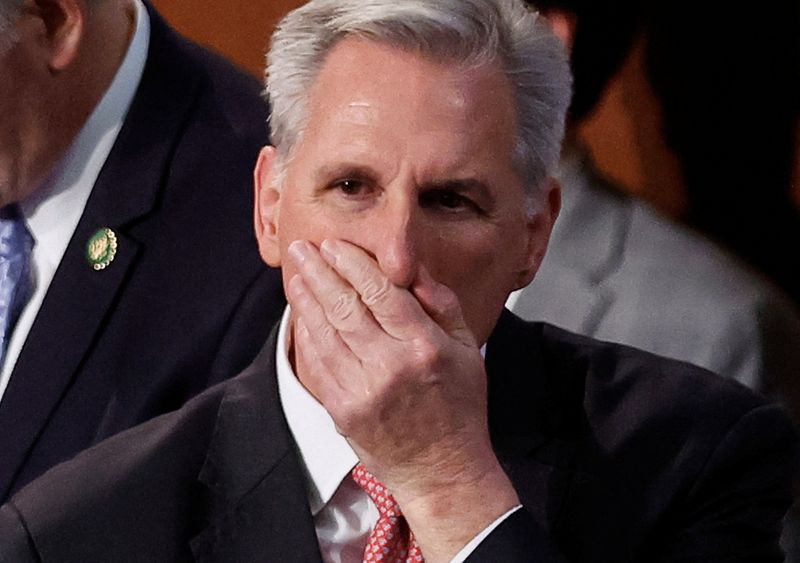By David Morgan
WASHINGTON (Reuters) - The bare-knuckle political fight among Republicans over Kevin McCarthy's run for speaker of the U.S. House of Representatives could signal trouble ahead when lawmakers need to agree on bigger issues, like addressing the nation's debt ceiling.
Republicans captured a thin House majority in November's midterm elections, breaking the hold of President Joe Biden's Democrats on both chambers of Congress. But instead of moving quickly on their own priorities, a group of about 20 hardliners have prevented the House from getting started by forcing repeated leadership votes.
McCarthy hopes to win the House gavel in the end by making concessions to his hardline opponents, but his allies warn that those deals would make his job all the more difficult if he wins the speakership and has to corral his narrow 222-212 majority.
"They've shown that we can't govern, and now they'll help Biden get wins before his reelection," fumed Representative Dan Crenshaw, a Texas conservative who backs McCarthy.
The biggest challenge facing the House in the coming months will be addressing the $31.4 trillion federal debt ceiling, which the U.S. Treasury is expected to reach later this year.
Congress has come to the brink of default over the past years in standoffs over raising the debt ceiling, which is needed to cover costs that lawmakers have previously agreed to take on.
A standoff in 2011 led Standard & Poor's to downgrade the U.S. credit rating for the first time, sending financial markets reeling. Congress most recently managed to lift the debt ceiling in December 2021 only because Republican Senate Minority Leader Mitch McConnell agreed to a rules change allowing it to do so.
That infuriated many House Republicans, including some who are now leading the opposition to McCarthy and demanding greater control over the House agenda.
Republican Representative Andy Biggs at the time called McConnell's deal "offensive and dangerous."
A standoff this year could rattle the global economy at a time when recession fears are already widespread.
McCarthy and many of the hardline Republicans have also vowed to punish Senate Republicans who helped pass a December 2022 bill that kept the government funded through September, averting a shutdown.
Another opponent, Representative Ralph Norman, said he would not vote for McCarthy because he would not commit to forcing a government shutdown, adding: "It's a trust issue."
Such a maneuver, the hardliners claim, could force deep spending cuts including changes to the Social Security and Medicare programs, moves they say are necessary to address the nation's rising debt.
UNDERCUTTING AUTHORITY
One particular concession that McCarthy has agreed to, according to a source, would allow any single member of the House to propose the speaker's ouster at any time, through a procedure called the "motion to vacate the chair."
Lawmakers tried to remove House speakers by invoking the rule in 1910 and in 2015, when former Republican Speaker John Boehner resigned after a hardline conservative filed a request to oust him.
Under Democratic Speaker Nancy Pelosi, such a move could be made only with support from a majority of either party. McCarthy's opponents now want to restore the rule to what it was before Pelosi's reign.
"The problem is for him that with every concession, he has to wake up every day wondering if he's still going to have his job," said Democratic Representative Richard Neal.
Boehner and his successor as speaker, fellow Republican Paul Ryan, both left the post after conflict with conservative hardliners whose influence has since grown.
"Individual members can now feel emboldened to call a motion to vacate, cause a stink or gum up the works of Congress, if they aren't getting what they want," said Kevin Seifert, a former aide to Ryan, who opted not to seek reelection in 2018 as the caucus took a harder right tack during Donald Trump's presidency.
"That will continue through the rest of this Congress, regardless of who is speaker," he added.
McCarthy has also agreed to give members of the House Freedom Caucus seats on a key rules panel that has jurisdiction over legislation earmarked for votes, the source said, potentially making the House floor harder to govern.
Other concessions, including one that would require 72 hours before a bill could come up for a vote, are likely to slow down House business.

"It's all about empowering us to stop the machine in this town from doing what it does," said Representative Chip Roy, a leading McCarthy opponent.
"I am open to whatever will give me the power to defend my constituents against this godforsaken city."